
Kidney replacement therapy, also known as renal replacement therapy (RRT), is a life-saving treatment for individuals with advanced or end-stage kidney disease. This therapy involves replacing the lost kidney function through various methods to maintain fluid and electrolyte balance and remove waste products from the body.
There are two types of kidney replacement therapy: dialysis and kidney transplant. Typically, kidney transplants involve being placed on a waiting list, as there is a shortage of donors. In the meantime, the patient undergoes dialysis as they wait for a replacement kidney.
Here is a comprehensive guide to kidney replacement, how it works, its benefits, and where you can go for this treatment in Sherman, TX.
Who Needs Kidney Replacement Therapy?
Kidney replacement therapy is primarily recommended for individuals with end-stage renal disease (ESRD), a condition where the kidneys’ function is irreversibly impaired. Common causes of ESRD include chronic kidney disease (CKD) progression, diabetes, hypertension, and various kidney disorders.
Individuals with ESRD experience a significant decline in kidney function, resulting in an accumulation of waste products and excess fluid in the body, which if not controlled, can lead to poor patient outcomes.
Patients need to undergo a comprehensive evaluation to determine their fitness for kidney replacement therapy.
How Kidney Replacement Therapy Works
To understand how kidney replacement works, it’s important to understand hemodialysis and kidney transplantation.
Hemodialysis
Hemodialysis is a type of kidney replacement therapy that involves blood being pumped from the patient’s body into a dialysis machine that contains a dialyzer. The dialyzer acts as an artificial kidney, removing waste products, excess fluids, and electrolytes from the blood before the machine returns the blood to the patient’s body.
Hemodialysis treatments typically last for a few hours and are usually performed three times a week in a health facility, under the supervision of medical professionals.
The benefits of in-house kidney dialysis include:
- Greater Time Efficiency – Hemodialysis treatments are typically conducted three times a week at a health center with each session lasting between three and five hours. This leaves most of the week dialysis-free.
- Lower Infection Risk – Hemodialysis carries a relatively low risk of infection. It utilizes an arteriovenous (AV) fistula, which is the gold standard vascular access method to a person’s blood. It is administered by medical professionals, making it a safe treatment.
- Fewer Surgical Interventions – Hemodialysis requires fewer surgical interventions. AV fistulas for dialysis are durable and last many years, even longer than transplanted kidneys or catheters for peritoneal dialysis. This type of dialysis typically does not necessitate additional surgeries.
Kidney Transplant
Kidney transplantation is a major surgery, which involves surgically placing a healthy kidney from a living or deceased donor into a recipient’s body to replace the failed kidneys. This is considered the most effective and long-term kidney replacement therapy.
Successful kidney transplantation allows individuals to lead a near-normal life with reduced reliance on dialysis treatments. However, finding a suitable donor can be quite complicated, since the kidney itself should be perfectly matched to the recipient. Additionally, medication needs to be taken to ensure the body does not reject the kidney transplant.
According to the American Kidney Fund, most people wait three to five years to get a new kidney. Some of the benefits kidney replacement patients can experience include:
- A Longer Life Expectancy – Most kidney transplant patients experience enhanced longevity compared to those without transplantation.
- Better Quality of Life – Patients report a significant improvement in their overall quality of life after receiving a kidney transplant.
- No Longer Need Kidney Dialysis – Kidney transplant recipients are relieved of the burden of regular dialysis sessions.
- Higher Energy Levels – With a functioning kidney, patients often have increased energy levels, making daily tasks, work, and travel more manageable.
- Fewer Dietary Restrictions – Transplant recipients enjoy fewer restrictions on what they can eat and drink.
- Improved Sex Life and Increased Fertility – Some patients may experience improved sexual health and increased fertility after kidney transplantation.
Kidney Replacement Therapy in Sherman, TX
Carrus Rehabilitation Hospital offers in-house kidney dialysis for our patients in our world-class healthcare facility. We are highly experienced in treating patients with renal insufficiency.
Our rehabilitation hospital is staffed with multi-specialty physicians, including nephrologists or kidney doctors, and is fully equipped to offer you or your loved one highly advanced medical care. Our patients receive daily visits from our physicians and benefit from around-the-clock nursing, ensuring comprehensive support throughout their treatment and recovery.
For any questions or to schedule a consultation, call our office today at (903) 870-2600. We look forward to assisting you with your or your loved one’s care.

